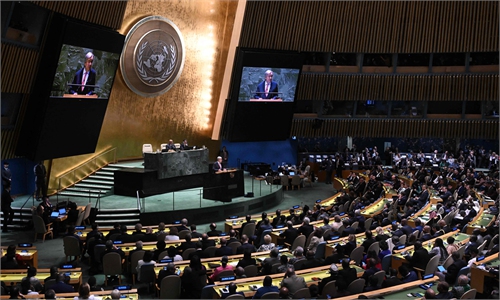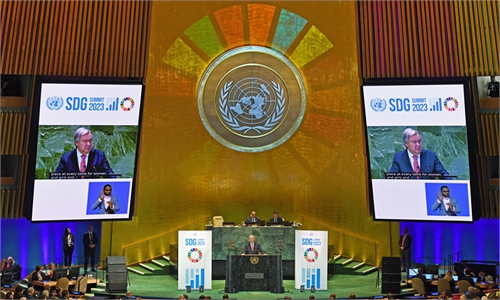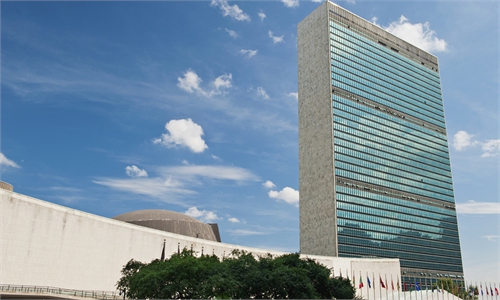China sends clear signal at UNGA, upholding true multilateralism
Vice President Han makes four-point proposal for dealing with world affairs
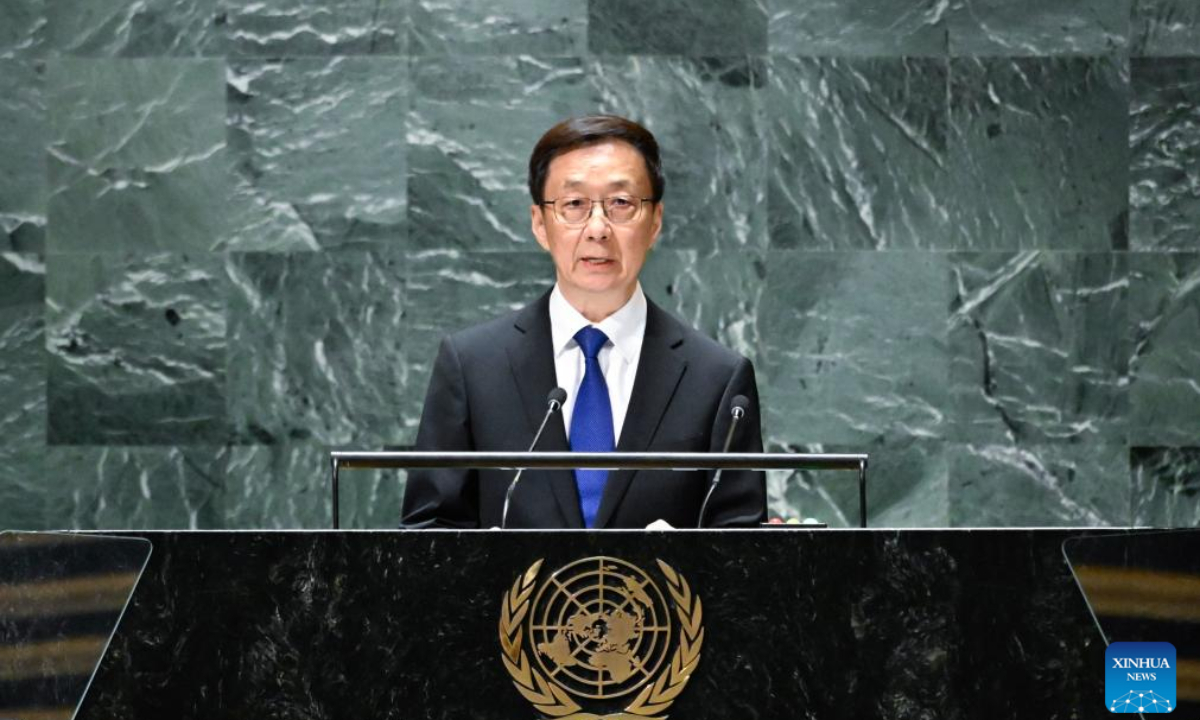
Chinese Vice President Han Zheng delivers a speech at the General Debate of the 78th session of the United Nations General Assembly (UNGA) at the United Nations headquarters in New York, Sep 21, 2023. Photo:Xinhua
While the US has been hijacking the ongoing United Nations General Assembly (UNGA) and turning it into a platform for touting its so-called leadership and peddle its "multilateral approach," Chinese Vice President Han Zheng sent out a clear signal upholding true multilateralism and elaborated in a comprehensive way on how to work together in building an open and inclusive world with lasting peace and prosperity.
The senior Chinese official also reiterated China's consistent position on the Taiwan question as some US-backed forces and the DPP authorities have been making some "trivial noises" at this annual gathering of world leaders, repeating their old trick of trying to turn the Taiwan question into a global topic.
In sharp contrast to the so-called "multilateral approach" adopted by the US, which is considered pseudo-multilateralism as its alliance-centered mindset only serves Washington's hegemony, China's approach in addressing the reform and development of global governance aims to build a community with a shared future for mankind and provide a solution for common challenges, experts said.
Defending true multilateralism
Speaking at the General Debate of the 78th session of UNGA on Thursday, Han called on the international community to follow the direction of a multipolar world and to make global governance more just and equitable.
Han said the legitimate security concerns of all countries should be addressed, the sovereignty and territorial integrity of all countries should be respected, and differences and disputes should be resolved in a peaceful way through dialogue and consultation.
When it comes to the Ukraine crisis, Han said China supports all efforts that are conducive to the peaceful resolution of the crisis and stands ready to continue playing a constructive role for the early attainment of peace.
Han also put forward a four-point proposal for tackling world affairs including upholding equity and justice, and maintaining peace and security; pursuing mutual benefit and delivering win-win outcomes, and achieving development for all; staying open and inclusive, and advancing human civilization; and staying true to multilateralism and improving global governance.
The vice president said that China will remain a member of the big family of developing countries. As the largest developing country, China is a natural member of the Global South, sharing weal and woe with the vast number of developing countries, Han said.
The concept of Global South has been gaining more attention as it is closely related to the ongoing strategic competition of major powers. There have been three prominent demands from the Global South - "no taking sides", "no bloc confrontation" and "no new Cold War," Zhu Jiejin, a professor of global governance studies at Fudan University, told the Global Times on Friday.
With those demands, developing countries are playing an important role in preventing a new cold war, so this concept of Global South goes beyond economic significance and now carries more political weight, he said.
With "Global South" becoming a buzzword in international politics, the US-led West has been instrumentalizing this concept and trying to exclude China, deprive it of its status as a developing country, and split the camp of developing countries.
"What the US has been touting is pseudo-multilateralism, as its essence is unilateralism to serve its own hegemony. This is completely different from the multilateralism based on inclusiveness and openness that many developing countries, including China, are supporting," Li Haidong, a professor at the China Foreign Affairs University, told the Global Times on Friday.
In the name of multilateralism, the US usually maintains the hegemony of pseudo-multilateralism, which is a destructive approach aimed at strengthening and consolidating its alliance system, even attempting to replace the UN-based multilateralism in the future, Li said.
Without mentioning the US by name, Han also pointed out in his speech at the UNGA that China opposes hegemonism and power politics, and opposes unilateralism and the Cold War mentality.
A few countries abuse illegal unilateral sanctions, causing serious damage to the harmony and stability of international relations, and the international community should resist them, he said.
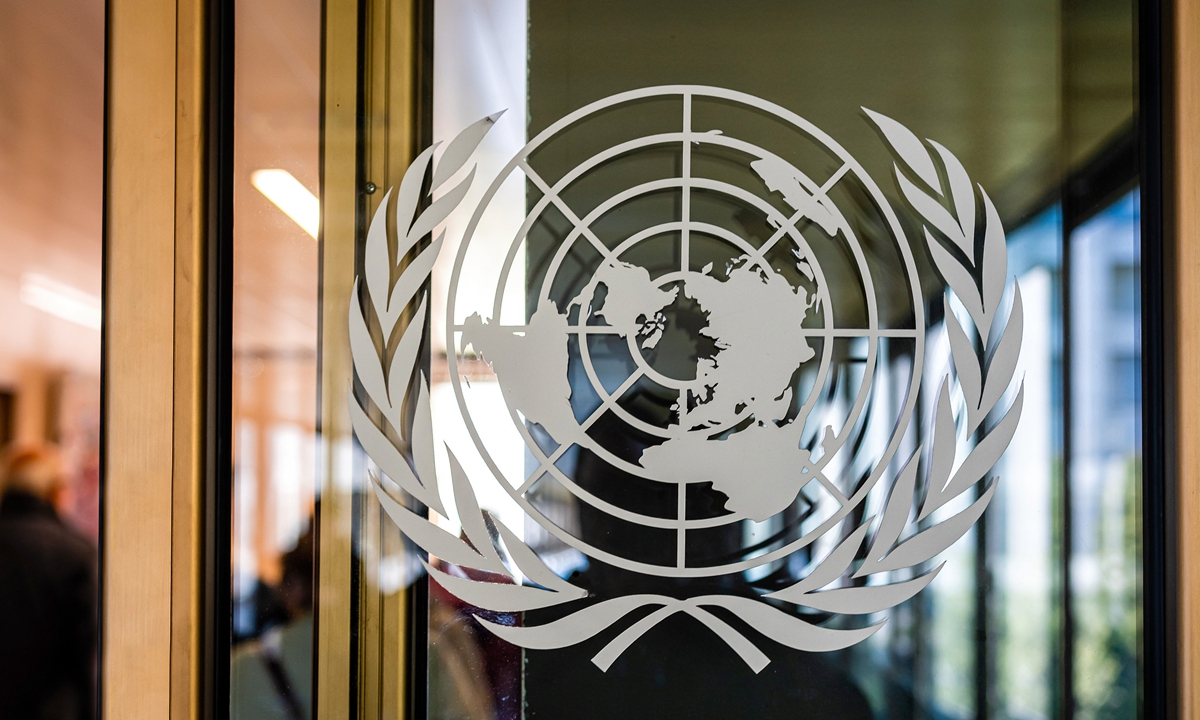
Photo: VCG
'Trivial noises' on Taiwan question
Besides China's approach to safeguarding and promoting multilateralism, a clear message from the Chinese leader on the Taiwan question was also put under the spotlight, as a small number of countries, along with the DPP authorities, have been making some noises at the ongoing UNGA and repeating some old tricks of hyping the island joining the UN as an independent representative.
China resolutely safeguards its sovereignty and territorial integrity. The government of the People's Republic of China is the sole legal government representing the whole of China, and Taiwan has been an inalienable part of China's territory since ancient times, Han told the meeting.
No one or force should ever underestimate the firm resolve, strong will and great capability of the Chinese people to safeguard their national sovereignty and territorial integrity, he said.
A very small number of countries, which have been maintaining so-called "diplomatic ties" with the island, including Guatemala, Paraguay and Palau, voiced support for the island's inclusion in the UN on Tuesday, local media in the island reported. Czech President Petr Pavel also hyped the Chinese military activities surrounding the Taiwan Straits in his address to the gathering.
"Every year, with the support of the US-led West, the DPP authorities repeated the old tricks of hyping the topic of its inclusion into the UN, in a bid to expand its international space," Xin Qiang, deputy director of the American Studies Center of Fudan University, told the Global Times on Friday.
Although the UN is an international stage, the annual UNGA is held in the US, which has been playing an active role in hyping the Taiwan question and making it an international topic, Xin said.
However, some experts considered those old tricks to be just trivial noises that are unlikely to attract much attention from the international community, as the one-China principle is a widely recognized consensus, and more importantly, developing countries have been focusing on non-traditional security issues at the UNGA.
"Some Western politicians are hyping the Taiwan question, trying to internationalize it and compare it with the Ukraine crisis, which is actually a narrative trap, as the nature of the Russia-Ukraine conflict is completely different from cross-Straits relations," Xin said.

